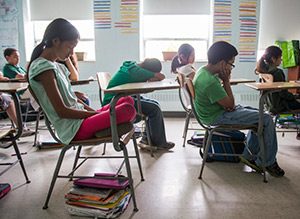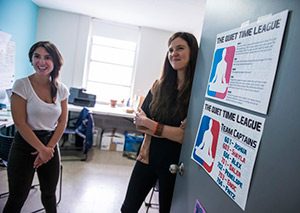In case you haven’t heard, the Transcendental Meditation® (TM) technique is on the minds of many students, teachers, and administrators these days. Jaweed Kaleem took an in-depth look at its application during Quiet Time at one school in Brooklyn, New York.
Brooklyn Urban Garden School (BUGS) has joined dozens of schools around the country and the world in implementing Quiet Time, a program that provides two 15-minute sessions every day so students can practice the TM technique or rest quietly. But is it working?

“I get into a lot more arguments with people when I do not meditate. I think it makes you feel less stressed,” one boy said.
“Your mind goes to rest, and we need that,” a girl added.
“It’s resting your mind, but I also think it’s about school,” another boy chimed in. “When I meditate, my grades go higher.”
Early Research
Because the program is new, research is limited, but “early studies point to better grades, fewer suspensions, and reports of better mental health among student meditators,” Kaleem reports.
“When you meditate, you produce alpha waves, your body calms down, your pulse drops, you go out of the fight-or-flight mode. Your cortisol levels drop. Your body gets a break. It feels pleasant,” said Joshua Aronson, an associate professor of applied psychology at New York University who has studied the impact of Quiet Time on students.
“Early studies point to better grades, fewer suspensions, and reports of better mental health among student meditators.” —Jaweed Kaleem, The Huffington Post
 What Teachers and Administrators Say
What Teachers and Administrators Say
Teachers and administrators are also joining in. “For myself, when I don’t meditate, I am a little more of a scatterbrain,” said Ms. Walker, who is in her first year as a BUGS teacher. “I’ve noticed in my students that if they miss the morning Quiet Time if they are late to class, they are the same way.”
“Some [students] took it as a joke at the beginning, like they didn’t really get what it was,” said Walker. “But now they are learning about the brain in class, and they are talking about neurons—how you can wake them up and put them to sleep, and how meditation can help heal your brain and body. I really see it making a difference.”
“I don’t think it’s a magic bullet,” said BUGS co-founder Miriam Nunberg, who previously was a special education teacher and attorney at the Department of Education. “Do we still see kids acting out? Of course we do. But we give them a tool to cope with stress and anxiety and help them focus.”


Comments
You May Also Like
TM in the News
Mantras before Math Class | 2:30
Today, it seems that the David Lynch Foundation can't keep up with the demand for TM and the Quiet Time program in schools across the country. Jennie Rothenberg Gritz, writing for The Atlantic, reports.
Better Health
Dr. William Stixrud: What TM Can Do for the Young Brain
"Because it is still developing, the adolescent brain is more vulnerable to the effects of chemicals, including drugs, alcohol, and stress hormones." —Neuropsychologist William Stixrud, Ph.D.
Education
Maharishi School Chosen As One of the Best Private High Schools Nationwide | 4:57
Maharishi School takes the spotlight in recent national recognition from Niche.com. TM is one key to the well-rounded curriculum at this K-12 school in Fairfield, Iowa that placed second in a ranking of private Iowa schools.
TM in the News
Meditation Curbs Violence at San Francisco Schools | 3:11
What happens when the TM technique is added to the curriculum of a struggling school? NBC Nightly News and Cynthia McFadden wanted to find out.